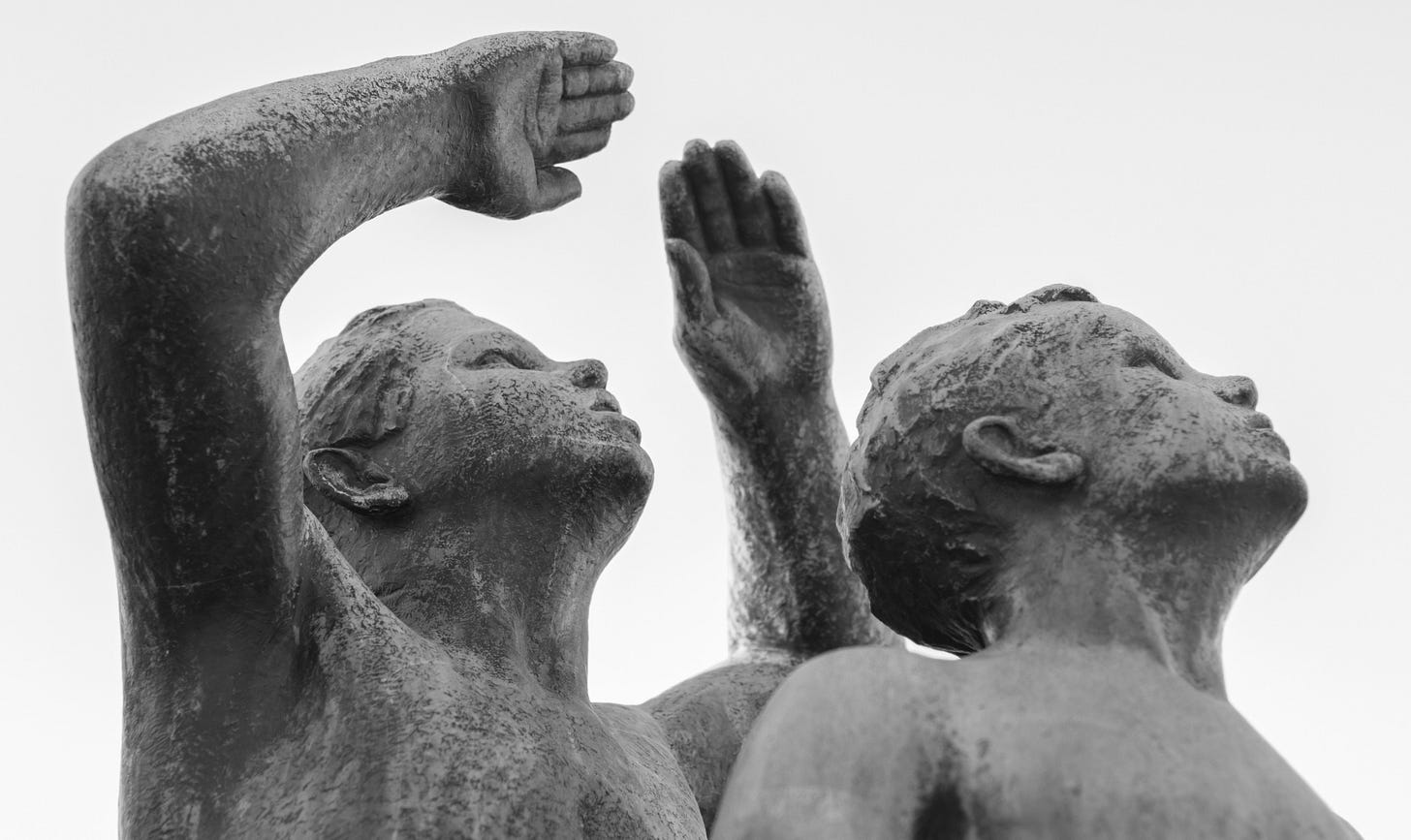Don’t make assumptions.
〰 Miguel Angel Ruiz 〰
Unassuming Assumptions
The way to keep yourself from making assumptions is to ask questions.
〰 Don Miguel Ruiz 〰
In 1997 a small book made big waves among readers who were trying to figure out how to better themselves and get their lives on track. I was one of them.
The Four Agreements, written by Don Miguel Ruiz, was every writer’s dream come true. The book went viral, became a bestseller for over a decade, and swept millions of seekers of indigenous wisdom off their feet and out of their mind traps.
The contents ~ four basic teachings grounded in ancient Toltec wisdom ~ are relatively simple to grasp. Putting them into practice is a whole other story.
Don’t make assumptions!
This is the third of the four Toltec agreements. The imperative statement alerts us to the fact that we’re making assumptions all the time. At least I do. So I assume, others do too. I assume it’s a common activity of the human mind. I assume others are like me and their minds function similar to mine, at least sometimes…
assumptions, assumptions…
“If we don’t make assumptions, we can focus our attention on the truth, not on what we think is the truth.” Miguel Ruiz explains. “Then we see life the way it is, not the way we want to see it. When we don’t believe our own assumptions, the power of our belief that we invested in them returns to us. And when we recover all the energy that we invested in making assumptions, we can use that energy to create a new dream: our personal heaven.”
Wow! From not making assumptions straight into our personal heaven… Can it really be that simple?
Don Ruiz also points out somewhere that “The way to keep yourself from making assumptions is to ask questions.”
Good to know. That’s very helpful. I’ll take your advice, Don Ruiz, and ask some questions right here:
(1) you say, If we don’t make assumptions, we can focus our attention on the truth, not on what we think is the truth. ~ does this mean I think my assumptions are ‘the truth’?
What if I think something is true without being aware that it’s an assumption?
(2) you say, Then we see life the way it is, not the way we want to see it. ~ does this mean my assumptions are what I want to see?
What if the way I see life is not the way I want to see it?
(3) you say, When we don’t believe our own assumptions, the power of our belief that we invested in them returns to us. ~ does this mean I believe my own assumptions?
What if I am riddled with self-doubt? Does that free my power of belief?
(4) you say, When we recover all the energy that we invested in making assumptions, we can use that energy to create a new dream. ~ does this mean my old dream is fuelled by assumptions?
What if ‘life the way it is’ doesn’t match my new dream?
Following the spectacular success of The Four Agreements Don Miguel Ruiz published five further books in the Toltec Wisdom Series, with coauthor Janet Mills, who is also the founder of Amber-Allen Publishing.
I assume, Amber-Allen Publishing has created their personal heaven on the wings of success of the Toltec Wisdom Series. A new dream come true…
How many of the millions of readers who bought, read, and followed the Toltec teachings are now living in their personal heaven?
An Assuming Character
I love to start characters in a place where you think you know them.
We can make all kinds of assumptions about them and think
they have no redeeming qualities, but like everyone, they're complex.
〰 Callie Khouri 〰
We make assumptions about every word we use. But like characters in any story, they are complex. The word assumption is no exception.
Assume [from Latin ad = to, near + sumere = to take] has been used in English in early 15 c. In the sense of to adopt, take in, admit; take upon oneself, undertake; take responsibility, take on board; take office, accept an obligation; to appropriate, invest oneself; to take for granted without proof, suppose as fact, take as principle for reasoning (1590s); take fictitiously, pretend (1600).
When the verb assume was taken on board in secular language, the noun had already been in use for a couple of centuries in a religious context. Assumption was first associated with the clerical meaning of going straight to heaven, by ‘uncorrupted reception’.
In the Catholic Church the Feast of Assumption of Mary is celebrated on the 15th of August.
Assumption c. 1300, originally in English the uncorrupted reception of the Virgin Mary up into heaven. Other meanings, acceptance, adoption, taking for granted, appropriation etc. follow the range of the verb.
In the Catholic Church and communities, the Feast of Assumption of Mary is celebrated on the 15th of August.
Coming from a fairly basic activity ~ sumere = to take ~ it is not surprising that an unassuming (= modest) word such as assumption has many relatives.
Assumptive (adj) taken in addition; capable of being assumed.
Consume [from Latin consumere = to use up, eat waste] English since late 14 c. originally meant to destroy by separating into parts which cannot be reunited, as by burning or eating, to destroy by use, wear out by applying to its natural or intended use.
Consumption was known as a disease marked by the wasting of the body, progressive emaciation.
Consumer in early 15 c. was a person who squanders or wastes. The current sense of people who uses goods or articles was originally understood as someone who destroys the exchangeable value of a commodity by using it. The sense of consumer as a valued buyer, customer, or client is only about a century old.
Presume [from Latin præsumere = to anticipate] originally used in the sense to form a tentative or provisional opinion based on limited knowledge and probability until modified or overthrown by further information. The secondary meaning to be arrogant, make unjustified demands, go beyond ordinary license or propriety are from 15 c.
Presumption [from Latin præsumptio = confidence, audacity] the noun has established itself in both senses (1) an idea or belief taken to be true on the basis of probability (synonymous with assumption) and (2) arrogance, disrespect of boundaries, transgression of limits or permission.
Presumptuous (adj) [from Latin præsumptuosus = full of boldness] arrogant, impertinent, brazen, overconfident, impudent has established itself in the adjective in the overbearing sense.
Resume (v) [Latin resumere = take again, assume again] 1400 regain, take back, take up anew; mid 15 c. recommence, begin again; 1802 continue, proceed after interruption.
Résumé (n) [Latin resumere] 1804 summary, recapitulation: 1940s biographical summary of a career.
Resumption [Latin resumptio] mid 15 c. repossession of lands, goods, etc., previously granted to someone (feudal term); from 1580s act of resuming; a taking up or commencing again (general sense); 1875 Specie Payment Resumption, restoration of the gold standard in U.S.
Resumptive (a+n) [Latin resumptus] referring to the nature of resumption; restorative, restoring medicine.
Subsume (v) [Latin subsumere = take under] 1580s to state a minor premise (in logic).
Subsumption (n) the act of subsuming.
Subsumptive (a) relating to subsumption, of the nature of subsumption.
Transumption [from Latin transumere = take, assume] the act of taking from one place to another; adoption, assumption; metaphor.
An archaic synonym for presumptuous is the outdated assuming, which has survived in its opposite counterpart unassuming (= modest, not pretentious, presumptuous, or arrogant.)
The Latin root sumere (to take) overlaps with emere (= to buy, take). English words derived from emere are emption (= purchase), exemption (= free from obligation), preemption (= purchase of goods before the opportunity is offered to others, literally buying in advance; preemptive action as a preventative measure), and redemption.
Redemption [from Latin redemptio = buying back, releasing, ransom] established itself in English in the biblical sense of deliverance from sin.
Further English words sprouted as side shoots of assumption are example (ex-emere) premium (pre-emption), prompt, impromptu (pro-emere) ransom (redemption) and sumptuous (sub-emere).
The following members of the family, once alive in English, are now extinct:
Absume [from Latin absumere = take away, diminish, consume, destroy] to bring to an end by gradual waste; consume; destroy; cause to disappear.
Desume [from Latin desumere = pick out, choose, take upon oneself] to take from, borrow.
Insume [from Latin insumere = take, assume] to take in, absorb.
Redemption from Assumption
You cannot question an assumption you do not know you have made.
〰 Buckminster Fuller 〰
The assumptions we live by are most likely not ours. Neither taken upon ourselves at an age capable of assuming such responsibility, nor presumed with sufficient awareness to accept their obligations, we are stuck with them for life, unless we succeed in absuming them, somehow.
Ready or not, we are prompted to live an impromptu life, consumed by preemptive presumption. My own linguistic history is a good example.
I started to speak relatively early. Having an older brother to egg me on may have been an incentive. My parents have told me on various occasions, they were baffled by the complicated words tumbling out of my baby mouth.
“She can’t possibly know, what she is saying!” my mother would tell my father, or vice versa. Was this truth or assumption? I was too young to remember.
What I do remember is that my mother said to me on various occasions, “no man will ever want to marry you.” I assume she used this prophetic phrase as a threat to make me tidy up the teenage mess in my room. She was wrong.
One of the effects of her false prediction was that it instilled a subliminal assumption of ‘unworthiness’ into my mind.
I also grew up with the assumption that girls are damsels who will one day be rescued by some knight in shining armour (presumably gleaned from the fairy tales my father read to us when we were young). I was wrong.
Anyway, a whole smorgasbord of assumptions, most of which residing in my unawareness, enabled me to create the old nightmare: my private hell.
As soon as I became aware of the role my mind played in this tragic personal drama, I knew I could redeem myself and my life. And I did. As a result, I had my own assumption-to-my-personal-heaven experience… which is a whole other story, to be told some other time.
P.S. My assumption-to-my-personal-heaven happened a couple of years before The Four Agreements were published. Could the Toltec mission of redemption from all assumptions of the collective human mind have reached me via the cosmic ocean? Am I still stranded on Assumption Island?
ISLAND MONKEYS by Joshua Bond We live on a remote island hoping to be rescued. When I say “we” I mean me, mainly, plus some others whom I see occasionally in the distance. We keep ourselves to ourselves, at least I do, so I assume they do too. We all struggle on our own hoping to make it through until one day when we are rescued. I’m not sure where this “one-day-I’ll-be-rescued” religion came from. Perhaps it’s because we are stranded on Assumption Island.







Island Monkeys indeed. I love this Veronika! I hear my Grandfather saying if you assume- you make an “ass” out of “u” and an “ass” out of “me” lol. Thanks for the truth in the meanings behind the words. The real story. Yes I read the Four Agreements in my self-help phase of the the 90s and early 2000s. Slowly to see that no amount of self help can replace self love. That cosmic ocean will find us all as it knows when we are ready? Something tells me you have lots to share. Just know I will read every word and live into the questions that arrive. There is no island when we share the spaces around the words. Beyond the barriers of language. Beyond the seas. We are building a boat here. Wherever we are. Thanks for providing the sails. Great poem too Josh! Bless you 🙏❤️
Hi Veronika, I love your explorations of language and culture. I seem to need to read 3 times before I see it all as a whole ... I hover around your work on words 😊 Your threads resonate ... prophetic phrases' ... 'smorgasbord of assumptions' ... 'wrong'. How interesting re your toddler self and the vocabulary. The poem is fabulous. Thank you 💜🙏